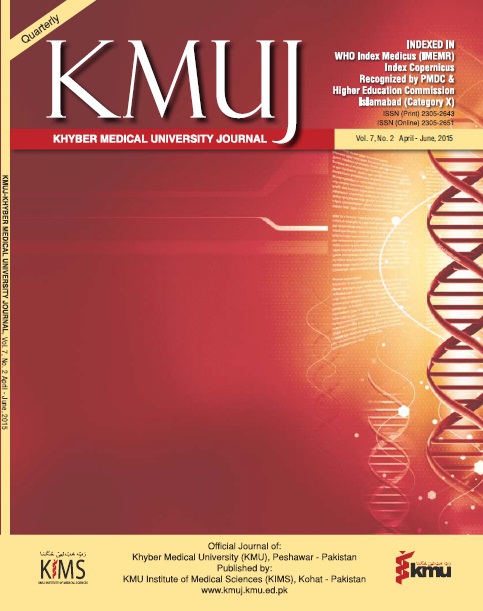Identification and Comparison of the Learning styles of MBBS students of the Conventional and Modular System
Main Article Content
Abstract
Objective: To find out the frequency of different learning styles of MBBS students of the Conventional and Modular System.
Methods: This descriptive cross sectional study was conducted at Rawal Institute of Health Sciences, Riphah International University Islamabad, Pakistan from June 01, 2013 to December 01, 2013. A sample of 293 MBBS students was randomly selected from both conventional and modular systems. Both male and female students were administered a questionnaire, based on Kolb’s learning style inventory to collect the initial answers and ranking of each participant. Calculations were done to reach the conclusion (learning style of each student). Data was analyzed by using SPSS 17.
Results: Out of 293 students, 159 (55%) belonged to the conventional system and 134 (45%) were from the modular system. In the conventional system majority of the students were convergers (37%), while remaining students were accommodators (26%), assimilators (21%), divergers (16%). Most of the students in the modular system were accommodators (16%) and remaining were divergers (11%), assimilators (11%) and convergers (7%).
Conclusion:The conventional system had more convergers who rely more on the abstract thinking or ideas whereas the modular system had more accommodators who believe in hands on practical learning.
Key words: Learning style, Accommodator, Diverger, Assimilator, Converger
Article Details
Work published in KMUJ is licensed under a
Creative Commons Attribution 4.0 License
Authors are permitted and encouraged to post their work online (e.g., in institutional repositories or on their website) prior to and during the submission process, as it can lead to productive exchanges, as well as earlier and greater citation of published work.
(e.g., in institutional repositories or on their website) prior to and during the submission process, as it can lead to productive exchanges, as well as earlier and greater citation of published work.
References
Watkins C, Dayan P. Learning. Machine Learning 1992; 8:279-92.
Pashler H, McDaniel M, Rohrer D, Bjork R. Learning styles concepts and evidence. Psychological science in the public interest. 2008;9(3):105-19
Christopher WA, Hayes J. Validity of the learning styles questionnaire. Psychol Rep 1990; 67:859-66.
Kolb AY. The Kolb learning style inventory version 3.1 2005 technical specifications. Boston, MA: Hay Resource Direct. 2005; 200.
Amjad I, Malik AN. Identify Learning style in students of medical discipline. Rawal Medical Journal. 2013; 38(2):184-7.
McParland M, Noble LM, Livingston G. The effectiveness of problem‐based learning compared to traditional teaching in undergraduate psychiatry. Medical education. 2004; 38(8):859-67.
Bhattacharya N, Shankar N, Khaliq F, Rajesh C, Tandon O. Introducing problem-based learning in physiology in the conventional Indian medical curriculum. national medical journal of India. 2005; 18(2).
Ganguly PK, Chakravarty M, Latif NA, Osman M, Abu‐Hijleh M. Teaching of anatomy in a problem‐based curriculum at the Arabian Gulf University: The new face of the museum. Clinical Anatomy. 2003;16(3):256-61.
Nandi P, Chan J, Chan C, Chan P, Chan L. Undergraduate medical education: comparison of problem-based learning and conventional teaching. Hong Kong Medical Journal. 2000;6(3):301-6.
Albanese MA, Mitchell S. Problem-based learning: A review of literature on its outcomes and implementation issues. Academic medicine. 1993;68(1):52-81.
Khan IA. problem based learning and institutions’ responsibilities. Khyber Medical University Journal. 2013;5(1):1-2.
Pask G. Learning strategies, teaching strategies, and conceptual or learning style. Learning strategies and learning styles: Springer; 1988. p. 83-100
Felder RM, Silverman LK. Learning and teaching styles in engineering education. Engineering education. 1988;78(7):674-81.
Morgan K, Kingston K, Sproule J. Effects of different teaching styles on the teacher behaviours that influence motivational climate and pupils' motivation in physical education. European Physical Education Review. 2005;11(3):257-85.
Baig L, Asad F. Introducing problem-based learning in a medical school with traditional/conventional curriculum. Journal of the College of Physicians and Surgeons--Pakistan: JCPSP. 2003;13(7):378-81
Mirghani H, Ezimokhai M, Shaban S, van Berkel H. Superficial and deep learning approaches among medical students in an interdisciplinary integrated curriculum. Education for Health. 2014;27(1):10.
